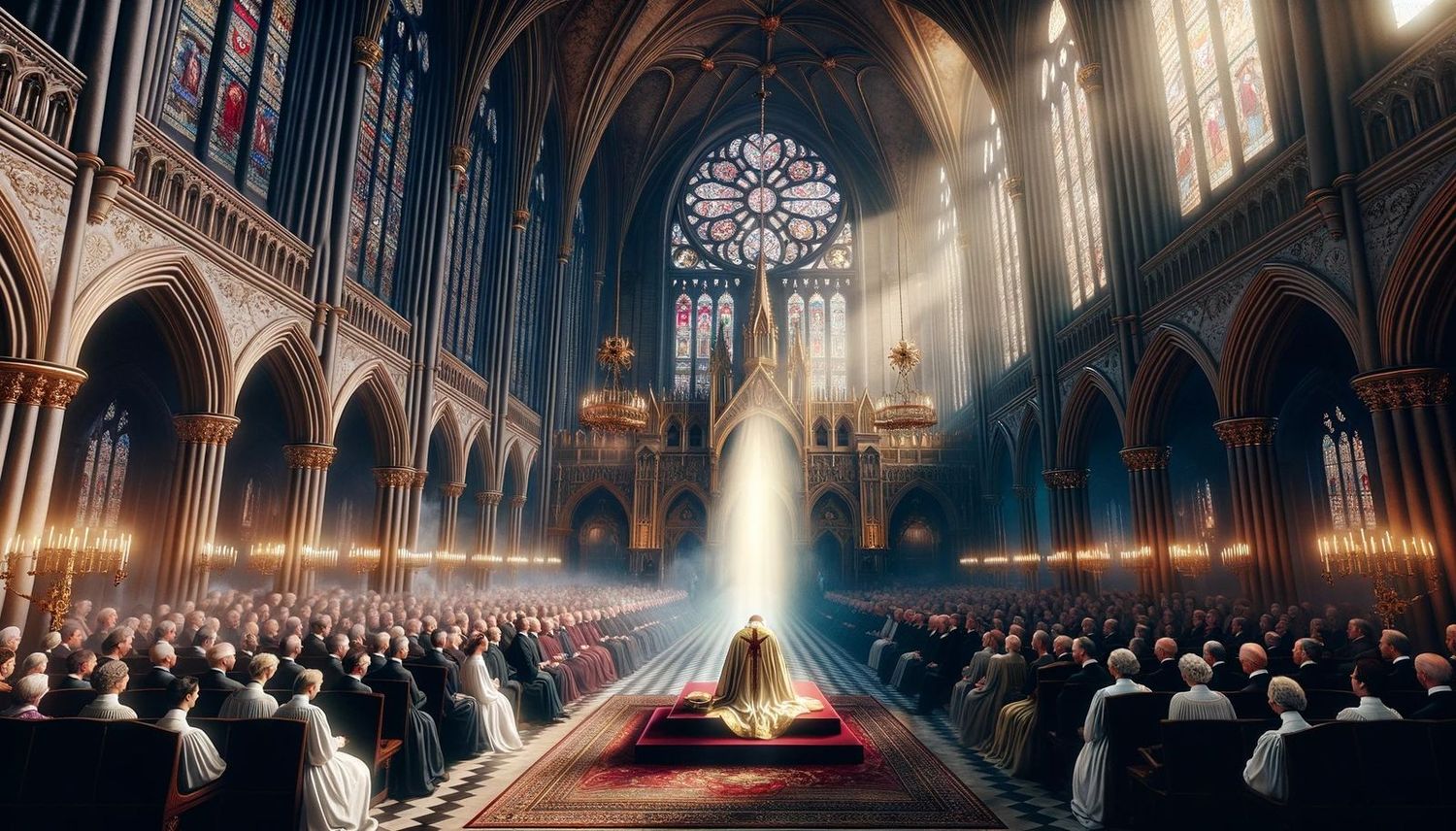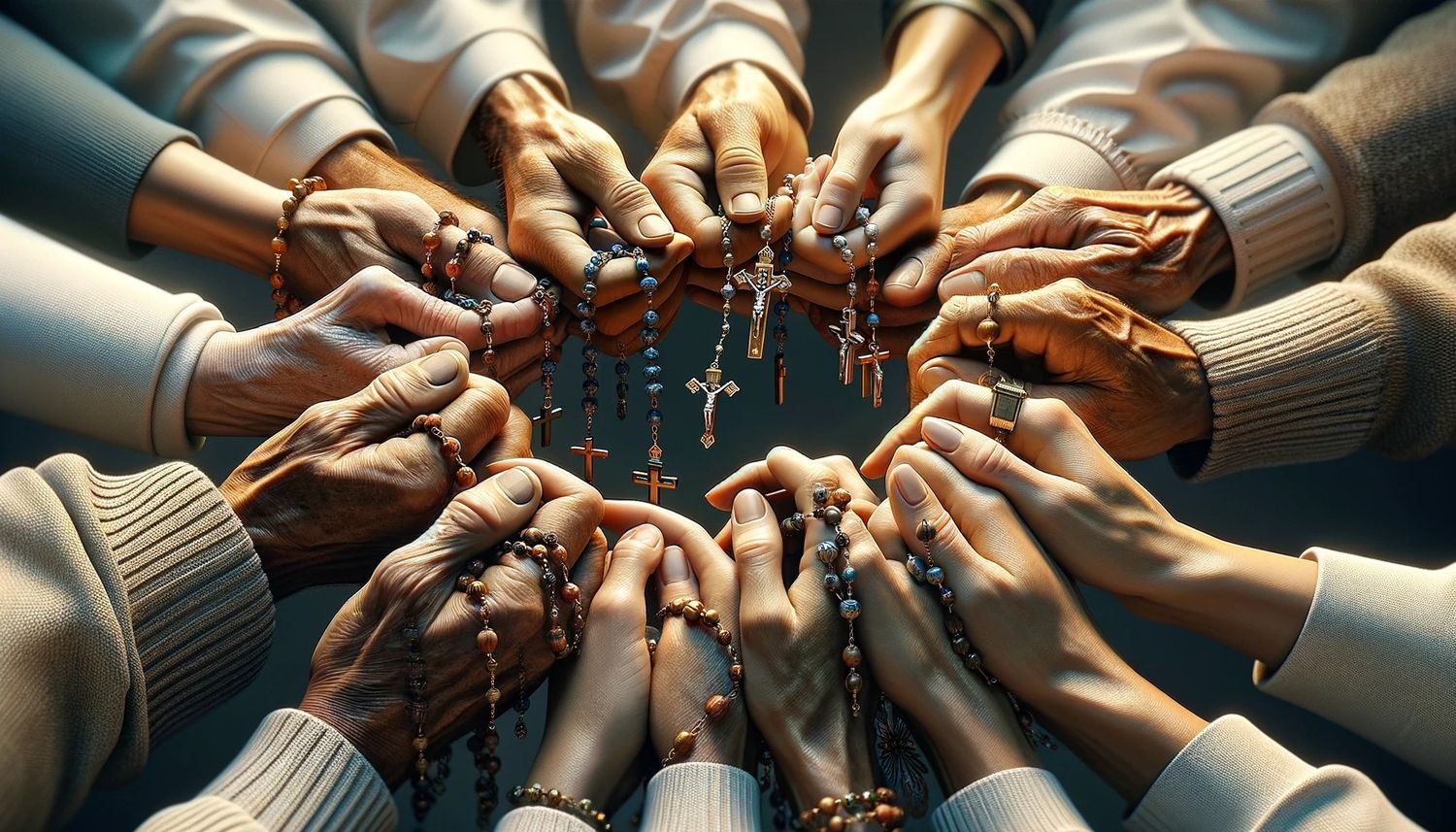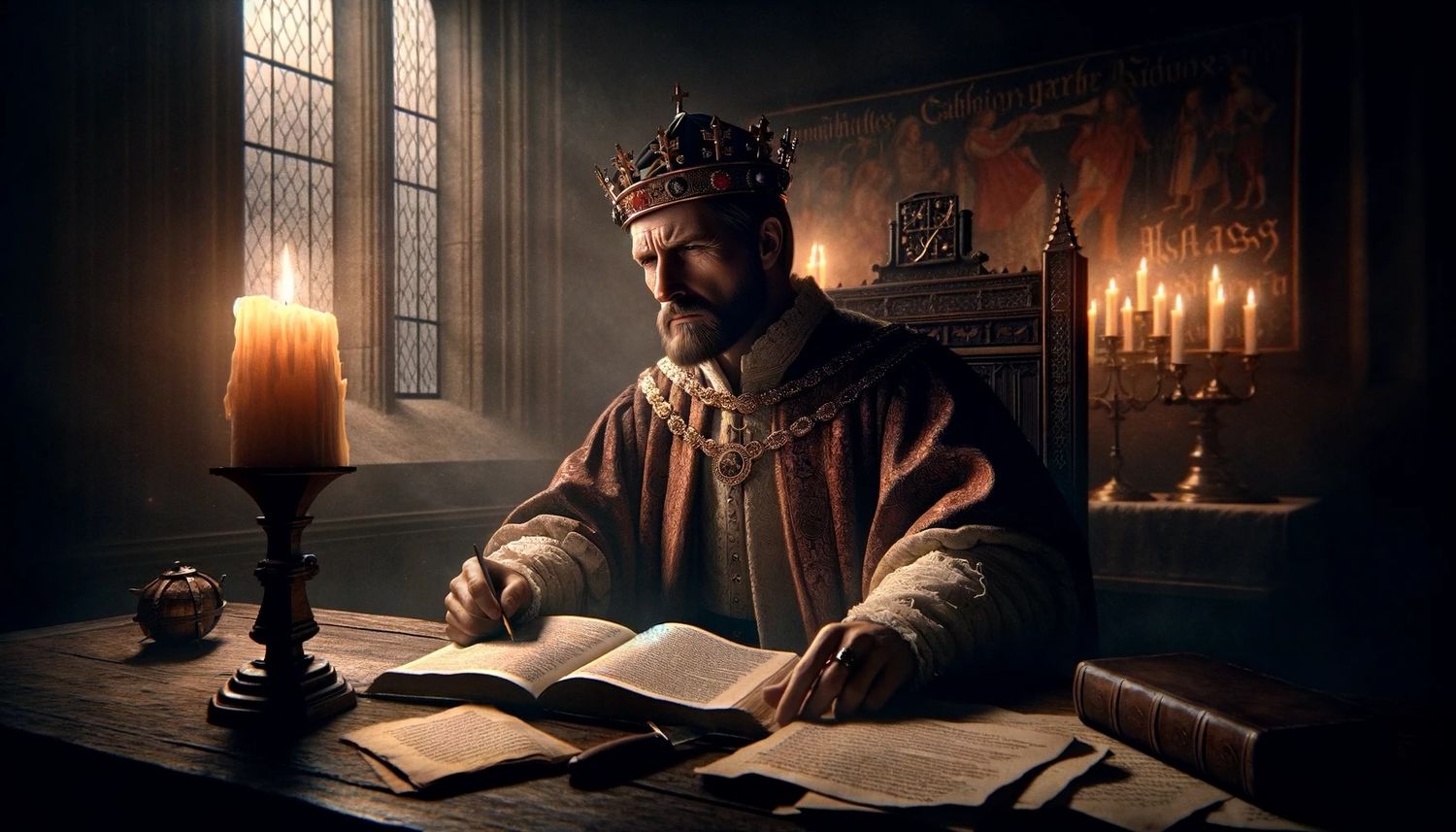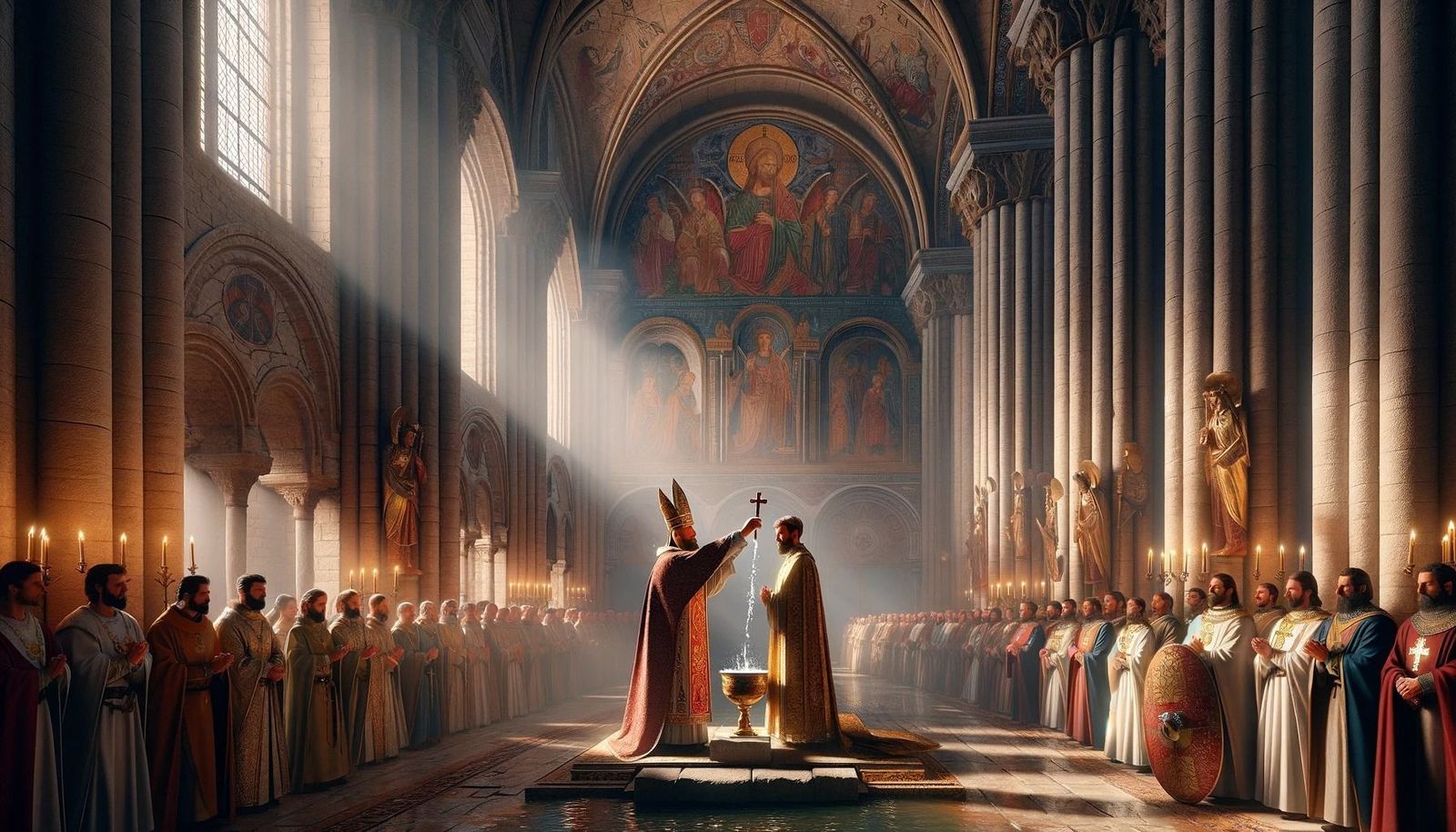Home>Theology and Spirituality>How To Convert To Catholicism For Marriage


Theology and Spirituality
How To Convert To Catholicism For Marriage
Published: February 18, 2024
Jason DeRose, Managing Editor at Christian.net, uses his expertise in religion and journalism to deepen understanding of faith's societal impacts. His editorial leadership, coupled with a strong academic background, enriches the platform’s diverse content, earning him recognition in both journalism and religious circles.
Learn how to convert to Catholicism for marriage and explore the theology and spirituality behind this important decision. Gain insights and guidance for a meaningful transition.
(Many of the links in this article redirect to a specific reviewed product. Your purchase of these products through affiliate links helps to generate commission for Christian.net, at no extra cost. Learn more)
Table of Contents
Introduction
Embarking on a journey to convert to Catholicism for the sake of marriage is a significant and deeply personal decision. It involves not only a commitment to a religious faith but also a profound spiritual and emotional exploration. This process can be both enriching and challenging, as it requires a genuine understanding and embrace of the Catholic beliefs and traditions.
The decision to convert to Catholicism for marriage often arises from a place of love and respect for a partner's faith. It signifies a willingness to honor and partake in the religious practices that hold deep meaning for the person you love. It is a beautiful expression of unity and a testament to the power of love to transcend differences.
As you embark on this journey, it's important to approach it with an open heart and a willingness to learn and grow spiritually. The Catholic faith is rich in history, tradition, and symbolism, and delving into its depths can be a profoundly rewarding experience. It offers a chance to connect with centuries of spiritual wisdom and to find solace and guidance in the teachings of the Church.
Throughout this process, it's essential to remember that conversion is not just a series of steps to fulfill a requirement; it is a personal and spiritual transformation. It involves a sincere examination of one's beliefs, values, and relationship with the divine. It's an opportunity to deepen your understanding of faith, morality, and the role of spirituality in your life.
As you navigate the path of conversion, you will encounter challenges, questions, and moments of profound insight. It's a journey that invites introspection, self-discovery, and a reevaluation of your spiritual identity. It's a testament to the power of love to inspire growth and transformation, both individually and as a couple.
In the following sections, we will explore the steps involved in converting to Catholicism for marriage, offering guidance and insights to support you on this meaningful and transformative journey.
Read more: How To Convert A Muslim To Catholicism
Understanding the Catholic Faith
Understanding the Catholic faith is a crucial first step in the journey of conversion for marriage. It involves delving into the rich tapestry of Catholic beliefs, traditions, and practices to gain a deep appreciation for the faith. At its core, Catholicism is centered on the teachings of Jesus Christ, as interpreted by the Church through centuries of theological reflection and tradition.
Embracing Catholic Beliefs
Central to Catholicism is the belief in the Holy Trinity – the Father, the Son, and the Holy Spirit – as the foundation of the Christian faith. Catholics also hold the belief in the sacraments, which are sacred rituals instituted by Christ to confer grace. These sacraments, including baptism, confirmation, and the Eucharist, play a significant role in the life of a Catholic believer.
Exploring Catholic Traditions
Catholicism is steeped in rich traditions that have been passed down through generations. From the celebration of the liturgical year to the veneration of saints and the importance of prayer, these traditions form the fabric of Catholic identity. Understanding and embracing these traditions is essential in fully integrating into the Catholic faith community.
Grasping the Role of the Church
The Catholic Church, with its hierarchical structure and global presence, plays a central role in the lives of its adherents. Understanding the authority of the Church, the role of the clergy, and the significance of the magisterium – the teaching authority of the Church – is fundamental in comprehending the Catholic faith.
Read more: How Do Adults Convert To Catholicism
Studying Catholic Morality and Social Teachings
Catholicism places a strong emphasis on moral and social teachings, advocating for principles such as social justice, care for the marginalized, and the sanctity of life. Exploring these teachings provides insight into the ethical framework that guides the lives of Catholic individuals and communities.
Engaging with Scripture and Tradition
The Catholic faith draws from both the Bible and sacred tradition, which are seen as complementary sources of divine revelation. Understanding the interplay between Scripture and tradition is essential in grasping the depth and richness of Catholic theology and spirituality.
Embracing the Mystical and Sacramental Nature of Catholicism
Catholicism is characterized by its mystical and sacramental nature, emphasizing the presence of the divine in the material world. Exploring the sacramental worldview and the mystical dimensions of the faith can offer profound insights into the spiritual landscape of Catholicism.
In essence, understanding the Catholic faith involves immersing oneself in its beliefs, traditions, teachings, and spiritual essence. It is a journey of discovery and contemplation, laying the foundation for a profound and meaningful conversion experience.
Meeting with a Priest
Meeting with a priest is a pivotal step in the process of converting to Catholicism for marriage. It provides an opportunity to engage in meaningful dialogue, seek spiritual guidance, and gain a deeper understanding of the Catholic faith. The priest serves as a compassionate and knowledgeable mentor, offering support and insight as you embark on this transformative journey.
During the initial meeting, the priest will likely inquire about your reasons for seeking conversion and your relationship with the Catholic faith. This conversation is an opportunity to express your genuine intentions and to articulate the significance of Catholicism in your life. It is essential to approach this meeting with sincerity and openness, as the priest will offer guidance tailored to your unique spiritual journey.
The priest may also discuss the sacrament of marriage within the Catholic Church, outlining its sacred nature and the responsibilities it entails. This conversation can provide clarity on the spiritual significance of the marriage commitment and the role of faith within the marital union.
In addition to addressing the theological aspects of conversion, the meeting with a priest often involves practical considerations. This may include guidance on the process of formally entering the RCIA (Rite of Christian Initiation of Adults) program, which is designed for individuals seeking to become fully initiated into the Catholic Church through the sacraments of baptism, confirmation, and the Eucharist.
Furthermore, the priest can offer insights into the local faith community, providing information about parish life, opportunities for spiritual growth, and avenues for active participation in the Church. This guidance can be invaluable as you integrate into the Catholic faith community and begin to build meaningful connections within the parish.
Ultimately, meeting with a priest is a profound and enriching experience that sets the stage for the spiritual journey ahead. It fosters a sense of welcome and support within the Catholic Church and lays the groundwork for a transformative process of conversion, spiritual growth, and preparation for the sacrament of marriage within the Catholic faith.
Read more: How Is Communion Related To Marriage?
Attending RCIA Classes
Attending the Rite of Christian Initiation of Adults (RCIA) classes is a pivotal and enriching aspect of the journey to convert to Catholicism for marriage. The RCIA program is designed to provide a comprehensive and immersive experience for individuals seeking to enter into full communion with the Catholic Church. It offers a structured and supportive environment for learning about the Catholic faith, participating in communal worship, and discerning the call to embrace Catholic beliefs and practices.
The RCIA classes typically encompass a series of sessions that delve into various aspects of Catholic theology, spirituality, and tradition. These sessions are facilitated by knowledgeable instructors, often including clergy members, experienced catechists, and dedicated members of the faith community. The curriculum is thoughtfully crafted to provide a well-rounded understanding of the Catholic faith, catering to individuals at different stages of their spiritual journey.
Throughout the RCIA process, participants engage in discussions, reflection, and prayer, fostering a sense of community and shared exploration of faith. The classes offer a space for individuals to ask questions, express their thoughts, and deepen their understanding of Catholic beliefs and practices. This interactive and participatory approach creates a nurturing environment for spiritual growth and discernment.
Key components of the RCIA curriculum may include the exploration of Catholic doctrine, the significance of the sacraments, the liturgical life of the Church, the role of prayer and spirituality, and the moral teachings of Catholicism. Participants also learn about the history of the Church, the lives of saints, and the rich tapestry of Catholic traditions. This comprehensive immersion into the Catholic faith provides a solid foundation for individuals seeking to embrace Catholicism wholeheartedly.
Moreover, the RCIA process is not merely an educational endeavor; it is a journey of spiritual formation and discernment. Participants are encouraged to reflect on their personal faith experiences, discern their call to Catholicism, and cultivate a deeper relationship with God. This introspective aspect of the RCIA journey allows individuals to explore the spiritual dimensions of their decision to convert to Catholicism, fostering a genuine and heartfelt embrace of the faith.
As individuals progress through the RCIA program, they are introduced to the liturgical seasons and celebrations of the Church, actively participating in the communal worship and prayer life of the faith community. This experiential engagement with Catholic rituals and traditions enriches the spiritual journey, fostering a sense of belonging and integration into the life of the Church.
In essence, attending RCIA classes is a transformative and enlightening experience that nurtures spiritual growth, fosters community, and provides a comprehensive understanding of the Catholic faith. It equips individuals with the knowledge, spiritual insight, and discernment necessary to embrace Catholicism authentically and prepare for the sacraments of initiation within the Catholic Church.
Receiving the Sacraments
Receiving the sacraments is a profound and sacred aspect of the journey to convert to Catholicism for marriage. The sacraments hold a central place in the Catholic faith, serving as visible signs of God's grace and presence in the lives of believers. As individuals progress through the process of conversion, they prepare to receive the sacraments of initiation – baptism, confirmation, and the Eucharist – marking their full incorporation into the Catholic Church.
Baptism, the first sacrament of initiation, symbolizes spiritual rebirth and cleansing from sin. Through the pouring of water and the invocation of the Holy Trinity, individuals are welcomed into the family of God, receiving the gift of grace and becoming members of the Church. This sacramental rite signifies a profound spiritual transformation, washing away the stain of original sin and initiating a new life in Christ.
Confirmation, the second sacrament of initiation, strengthens and seals the grace received at baptism. Through the anointing with sacred chrism and the laying on of hands by a bishop or priest, individuals are empowered by the Holy Spirit to boldly profess and live out their faith. Confirmation deepens the bond with the Church and equips individuals with the gifts of the Spirit to bear witness to the Christian faith.
The Eucharist, the third sacrament of initiation, holds a central place in the life of a Catholic believer. Through the reception of the body and blood of Christ, individuals enter into a profound communion with Jesus and with the faith community. The Eucharist nourishes the soul, unites believers with Christ, and strengthens their commitment to live as disciples of the Lord.
Preparing to receive the sacraments involves a period of spiritual formation, prayer, and reflection. It is a time of deepening one's relationship with God, embracing the teachings of the Church, and discerning the call to live out the Catholic faith. The sacraments of initiation mark a pivotal moment in the journey of conversion, signifying a full integration into the sacramental life of the Church and a deepening commitment to the Catholic faith.
Receiving the sacraments is a sacred and transformative experience, imbued with profound spiritual significance. It represents a tangible expression of one's embrace of the Catholic faith and a solemn commitment to live out its teachings. As individuals prepare to receive the sacraments of initiation, they embark on a journey of profound spiritual renewal, grace-filled transformation, and a deepening communion with the living presence of God in the Catholic Church.
Preparing for Marriage in the Catholic Church
Preparing for marriage in the Catholic Church is a deeply meaningful and spiritually enriching process that involves both practical and sacred elements. It is a journey that encompasses the nurturing of a couple's relationship, the exploration of the sacrament of matrimony, and the integration of faith into the union. The Catholic Church places great emphasis on the sacredness of marriage, viewing it as a covenant rooted in love, fidelity, and the divine presence. As couples embark on this preparation, they are guided by the Church's teachings and rituals, fostering a profound understanding of the sacramental nature of marriage.
Pre-Cana Preparation
One of the central components of preparing for marriage in the Catholic Church is the participation in a Pre-Cana program. Named after the biblical town of Cana where Jesus performed his first miracle at a wedding, Pre-Cana programs offer engaged couples an opportunity to delve into the spiritual, emotional, and practical aspects of marriage. These programs are often facilitated by clergy, married couples, and experienced counselors who provide guidance on communication, conflict resolution, and the spiritual dimensions of married life. Through workshops, discussions, and reflection, couples are equipped with the tools to nurture a strong and enduring marital bond.
Read more: How Does An Anglican Convert To Catholicism
Understanding the Sacrament of Matrimony
Central to the preparation for marriage in the Catholic Church is a deep exploration of the sacrament of matrimony. Couples are invited to reflect on the sacred nature of marriage as a visible sign of God's love and grace. They are encouraged to embrace the theological and spiritual significance of the marital covenant, understanding it as a reflection of Christ's love for the Church. This contemplation fosters a reverence for the sacrament and a commitment to living out its sacred vows in accordance with the teachings of the Church.
Nuptial Mass and Liturgical Celebrations
As couples prepare for marriage in the Catholic Church, they engage in the planning of the nuptial Mass, a sacred liturgical celebration that unites the sacrament of matrimony with the Eucharistic sacrifice. The nuptial Mass is a profound expression of the couple's commitment to God and to each other, surrounded by the prayers, blessings, and rituals of the Church. Through careful preparation and participation in the liturgical aspects of the wedding, couples embrace the spiritual dimensions of their union, seeking God's grace and blessings as they enter into the sacrament of marriage.
Embracing Catholic Family Life
Preparing for marriage in the Catholic Church also involves an exploration of the role of faith within the context of family life. Couples are encouraged to cultivate a domestic church, where the values of love, compassion, and faith are nurtured. They are invited to embrace the teachings of the Church on marriage and family, seeking to create a home environment that reflects the love and grace of God. This preparation extends beyond the wedding day, encompassing a commitment to building a life together rooted in the principles of Catholic faith and love.
In essence, preparing for marriage in the Catholic Church is a transformative and spiritually enriching journey that encompasses the sacred, practical, and communal aspects of the marital union. It is a process that fosters a deep understanding of the sacrament of matrimony, the integration of faith into the couple's life, and the nurturing of a love that is rooted in God's enduring grace. As couples prepare for this sacred commitment, they are guided by the wisdom and traditions of the Church, embracing the profound significance of marriage within the Catholic faith.
Conclusion
The journey of converting to Catholicism for the sake of marriage is a profound and transformative experience that encompasses spiritual growth, deepening faith, and the nurturing of a sacred union. It is a testament to the power of love to inspire individuals to embrace a new spiritual path, rooted in the rich traditions and teachings of the Catholic Church.
As individuals embark on this journey, they are invited to delve into the depths of Catholic beliefs, traditions, and sacramental life, fostering a profound understanding of the faith. Meeting with a priest serves as a guiding light, offering spiritual counsel and support as individuals navigate the process of conversion. Attending RCIA classes provides a comprehensive and immersive experience, equipping individuals with the knowledge and discernment necessary to embrace Catholicism authentically. The reception of the sacraments marks a pivotal moment in the journey, signifying a full integration into the sacramental life of the Church and a deepening commitment to the Catholic faith.
Preparing for marriage in the Catholic Church further enriches this journey, guiding couples through the sacred and practical aspects of the marital union. It fosters a deep understanding of the sacrament of matrimony, the integration of faith into the couple's life, and the nurturing of a love that is rooted in God's enduring grace.
Ultimately, the journey of conversion to Catholicism for marriage is a testament to the transformative power of faith and love. It is a journey that invites individuals to explore the depths of their spirituality, to embrace the wisdom of the Church, and to cultivate a profound relationship with God. It is a journey that celebrates the sacredness of marriage, the richness of Catholic traditions, and the enduring grace of the divine.
As individuals and couples embrace the Catholic faith, they become part of a vibrant and supportive community, united by a shared commitment to spiritual growth and the living out of the Church's teachings. This journey is not merely a series of steps; it is a profound and deeply personal transformation, enriching the lives of those who embark on it and fostering a deep and enduring connection to the Catholic faith.












